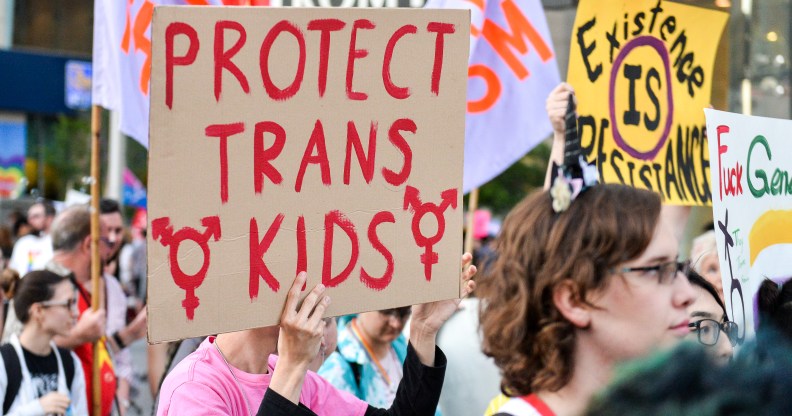Trans teen who waited three years for puberty blockers reveals devastating impact of being denied the treatment

(Anatoliy Cherkasov/SOPA Images/LightRocket via Getty)
A 17-year-old trans girl has spoken out about the heartbreaking impact of being forced to go through male puberty because she wasn’t given access to puberty blockers.
Sonja, a college student in the West Midlands, told the i that missing out on puberty blockers left her feeling self-conscious, uncomfortable, on the verge of self-harming, suffering from regular panic attacks and struggling to sleep.
“I know there’s a lot of debate at the moment about hormone blockers and regret but nobody is listening to people like me,” Sonja said.
“I can’t put into words how much I regret not having access to blockers and hormones.
“They’re a necessary requirement for me to comfortably live my truth and the fact that I’m still not being given that opportunity has such a negative impact on my psychological well-being.”
Access to puberty blockers threatened by legal case.
Puberty blockers have been in the news for the past week, since the UK’s High Court finally granted permission for a judicial review into whether young transgender people are able to give informed consent to the treatment.
The medication is prescribed to trans teens by specialist gender doctors at the NHS’s gender clinic for under 18s, GIDS.
The legal challenge is an attempt to force trans teens to go before a judge before being given medical treatment by doctors.
“I think it is important for there to be a judicial review in any system,” Sonja said. “I do think there are parts that need to be reviewed, like waiting list times.
“But the idea being lodged that a person is rushed into taking the blockers and transitioning seems to me a rare occurrence.
“I know an exhaustive amount of people who have gone through the system at GIDS.
“They won’t even approach the issue of puberty blockers until they address a patient’s preexisting mental health conditions first, and make sure they are making the right decision in a mentally sound state.”
Waiting lists blocking young people from accessing treatment.
Sonja was put on the waiting list for GIDS in November 2017, but two years later was told she was being taken off the waiting list because she wouldn’t be seen before her 18th birthday.
In the time she spent waiting for an appointment at GIDS, Sonja went through male puberty and its irreversible effects, which means she’ll have to undergo invasive surgery to minimise.
“The idea of puberty blockers is to halt the natural progression of biological puberty, stop the effects, at least halt the effects of [testosterone] on the body, the enlargement of the Adam’s apple, the change in muscle density, overall bone structure, and bone growth,” she says.
“The blockers are taken to pause the onset of puberty while a person contemplates whether or not they want to transition. It means that if they do, they won’t have to undergo invasive surgery to remove those characteristics brought about by biological puberty.
“I’ve had to come to terms with the fact that part of my transition will require significant amount of surgeries, invasive and not. Because the blockers won’t put a pause on my puberty, I will enter adulthood tasked with feminising my ‘male’ characteristics.
“To alter from just my neck upwards, there’s probably around five facial feminisation surgeries, including the reduction of my jawline, rhinoplasty, and a tracheal shave to reduce the size of my Adam’s apple. Those surgeries are specifically to remove the effects that male puberty has had on my body.”
Mermaids, the charity working with young transgender and gender-diverse people that supports Sonja, has said it may apply to intervene in the High Court case on behalf of the young people it supports.
The Tavistock and Portman NHS Trust, which GIDS falls under, said: “We welcome the opportunity to make the case for the quality of care the service provides in a thorough and nuanced way. Our work in GIDS is provided in accordance with best practice and relevant national and international specifications and guidelines.
“We are disturbed by the level of misinformation in relation to the support provided to these young people. The often-toxic debate around the topic has caused considerable distress to patients and families. We hope the hearing will serve to set the record straight and put centre-stage the voice and interests of young people living with gender dysphoria.”

